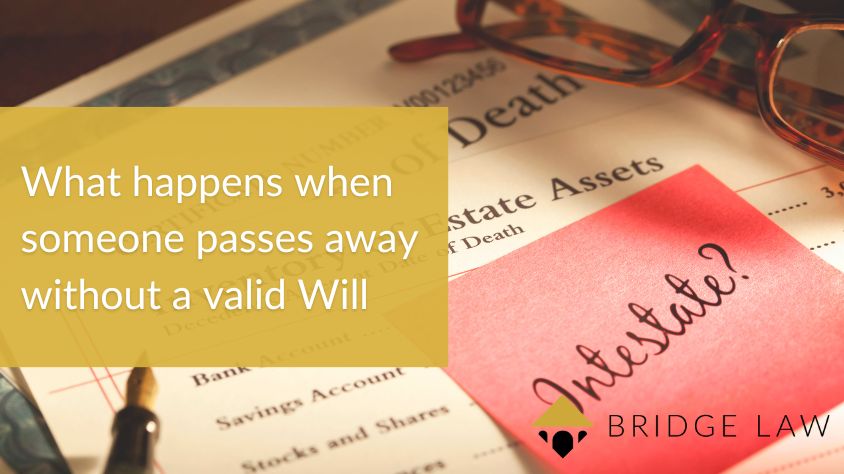What happens when someone passes away without a valid Will

If a person passes away intestate, it means they haven’t left a valid Will in place. This means that their estate will be dealt with according to the Rules of Intestacy. In this blog, we’ve shared what this means and why we always recommend adults of all ages have a valid Will in place and ensure it is up to date following any major life changes.
Who can inherit under the Rules of Intestacy?
If you pass away and haven’t left a valid Will in place (i.e. either no Will has been written or a Will has been written but is deemed invalid), then your property, otherwise referred to as your ‘estate’ will be shared out under the rules of intestacy, which may not align with your wishes.
Under the rules of intestacy, only married or civil partners and certain other close blood-related relatives, such as surviving children, grandchildren, or great-grandchildren and in some cases, parents, brothers, sisters, nieces and nephews, can usually inherit.
Usually, the automatic person to inherit is a surviving partner, but only if they were married or in a civil partnership at the time of death (even if they had separated but not yet divorced – which is why we always recommend writing a new Will when you separate but haven’t yet finalised the divorce or dissolution of your civil partnership.) You can read more about the various reasons why you should make a new Will following separation in one of our previous blogs here.
If you are married or in a civil partnership, estates worth up to £270,000 will automatically pass to your spouse. However, anything over £270,000 will then begin to be shared out with other close relatives under the Rules of Intestacy – which gets a little more complex.
Others who can inherit when someone passes away without leaving a valid Will in place are people who own properties as joint tenants or bank accounts in joint names with the deceased – in these circumstances, the remaining share of the property or money in the bank automatically passes to the surviving individual. However, if properties are held together as tenants in common, then the deceased’s share of the property would pass under intestacy rules.
The order in which relatives can inherit can be quite difficult to get to grips with. However, those to receive inheritance under the rules of intestacy would be as follows in order if there are no relatives in the class of relatives above:
- First to inherit, married spouse or civil partner (an entire estate up to £270,000) plus all personal possessions and half of any balance over the £270,000, the other half passing to children or if no surviving children, grandchildren or of none passing to the class of relatives below in this list.
- Second – children, but only if there is no surviving spouse or the estate was over £270,000, as above.
- Third – grandchildren and great-grandchildren
- Fourth – parents
- Fifth – brothers or sisters followed by half-brothers and sisters
- Sixth – nieces and nephews
- Grandparents
- Uncles and aunts followed by half uncles and aunts
Who has no right to inherit under Intestacy Rules, and why should you make a Will?
Who can inherit under intestacy rules can get confusing if there is no surviving married or civil partner or children. However, people who have zero rights to inherit when someone dies without leaving a Will, who often think they might be entitled to inherit, are:
- Long or short-term partners who are not married or in a civil partnership
- Relations by marriage
- Friends
- Carers
- Stepchildren that have not been officially adopted
Often, many people wish to leave part of their estate to such individuals, especially in the situation of long-term partners or step-children, as blended families or unmarried couples are increasingly common now. This is why we urge everyone to make a Will, as the intestacy rules do not consider the setup of many modern-day families.
What happens if you were financially dependent on the deceased?
If you have no official right to inherit under the intestacy rules, for example, if you are an unmarried partner but you relied on the deceased financially – you may be able to apply to the court to receive financial provision from the estate. You should seek legal advice to assess potential eligibility in this situation and the likelihood of success in your case.
What happens if there are no surviving relatives?
In relatively uncommon circumstances, where there are no surviving relatives eligible to inherit under the rules of intestacy, then an intestate person’s estate would pass to the crown – referred to as the term bona vacantia.
In some situations, if you believe you had a reason for financial provision, you may be able to apply for a grant from the estate. However, there is no guarantee of success with these applications, so legal advice is recommended before proceeding.
Other reasons to make a Will aside from choosing who gets to inherit your estate
As well as putting forward your chosen beneficiaries, who you wish to inherit from your estate, your Will can express your wishes in various different matters – which otherwise would likely be dealt with differently from how you would hope. This could include, for example:
- Appointing who you wish to be guardians of your children
- Putting money into a trust for children and grandchildren for when they reach a certain age
- Funeral wishes (although you should always make this known to your loved ones as Wills are not always read before a funeral takes place)
- Charitable gifts from your estate
- Appointing executors of your Will to administer the probate
- Specific gifts, for example, many people leave specific items to a loved one
- Appointing what you would like to happen to pets
If you need assistance in making a Will, along with advice on what you should include, contact our specialist Wills and Probate team on 01484 442 700 (Holmfirth) or 0161 427 0044 (Marple Bridge) or email us at info@bridgelawsolicitors.co.uk.
Written by Carol-Anne Baker

contentious probate, Intestacy Rules, Rules of Intestacy, Wills, Wills and Probate
